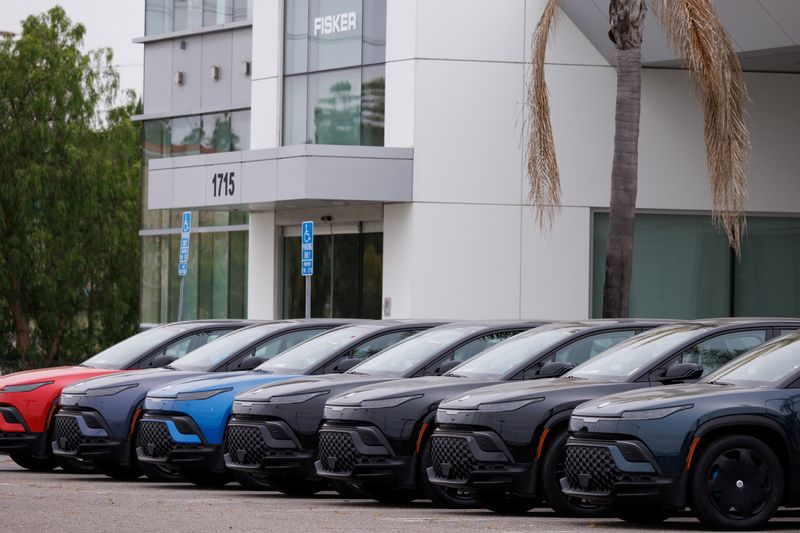(Reuters) - U.S. electric vehicle startups are turning to cheaper models, slamming the brakes on their production ramp-up plans and laying off employees to navigate a slump in demand due to steep borrowing costs and high repair expenses for the vehicles.
Fisker filed for bankruptcy protection on Monday, becoming the latest electric-vehicle startup to succumb to fundraising difficulties, production hurdles and challenges with distribution.
Here's how EV startups are trying to steer through the demand weakness:
FISKER
Fisker is looking to sell its assets and restructure debt, hurt by rapid cash burn to deliver its Ocean SUVs in the United States and Europe.
Its Ocean SUV, is being investigated by the U.S. National Highway Traffic Safety Administration for safety-related incidents.
The company recalled more than 18,000 cars in North America and Europe earlier this month due to faulty software and non-compliance with safety standards.
Fisker issued a going-concern warning in March and said it would lay off 15% of its staff and pause investments on future projects until it secures partnership with a manufacturer.
Reuters has reported that Nissan is in advanced talks to invest in Fisker in a deal that could provide the Japanese automaker with access to an EV truck while giving the struggling startup a financial lifeline.
Demand has been weak for Fisker's flagship Ocean electric SUV. Despite producing more than 10,000 vehicles in 2023, the company delivered only about 4,700.
The company ended 2023 with cash and cash equivalents of $325.5 million, compared with $736.5 million in 2022.
RIVIAN AUTOMOTIVE
Earlier in June, Rivian announced the second generation of its R1T pickup truck and R1S SUV with new drive units and other components to boost efficiency and reduce costs.
In March, Rivian introduced its smaller, less expensive electric R2 SUVs and R3 crossovers with plans to start producing the R2 at its existing U.S. factory to hasten deliveries in the first half of 2026.
The move came weeks after the company said it was planning a weeks-long production shut down this year to upgrade its factories and cut costs.
The company expects to produce 57,000 vehicles in 2024, well below estimates of 81,700 units. That is also far below the estimated 1.8 million vehicles Tesla (NASDAQ:TSLA) delivered in 2023.
After shying away from cutting the price of its vehicles last year, Rivian in February introduced lower-range options for its existing cars that are $3,100 cheaper.
The startup has focused on reducing its cash burn by re-negotiating supply contracts and building some components in-house. Rivian posted cash and cash equivalents of $5.98 billion for the first quarter, compared with $7.86 billion in the fourth quarter.
LUCID GROUP
Lucid Group said it will reduce its workforce in the United State by 6% in May as slower-than-expected growth in demand for electric vehicles hampers its path to profitability.
Lucid, backed by Saudi Arabia's Public Investment Fund as its largest investor with a stake of more than 60%, is set to start production of a more affordable mid-size car in late-2026 and its Gravity SUV this year, to attract a larger customer base.
The company has missed analysts' expectations for revenue for six straight quarters. It has slashed the price of the Lucid Air Pure to $69,900 and is including two years of free scheduled maintenance and charging allowance as an incentive.
Lucid in November unveiled its Gravity SUV that will start under $80,000 and is expected to go into production late this year.
The company has said it aims to start producing a cheaper midsize vehicle in late 2026 to compete with Tesla's Model 3 and Model Y vehicles, with a price point of around $50,000.
Lucid ended the first quarter with cash and cash-equivalents of $2.17 billion, compared with $1.37 billion in the fourth quarter of last year.
NIKOLA
Nikola is pivoting to big rigs powered by hydrogen, after some of its battery-electric trucks caught fire in August and forced a recall.

The company expects up to $170 million in truck revenue for 2024 with a target to sell 450 units this year, including its hydrogen fuel cell electric trucks.
Nikola's cash and cash equivalents at the end of the first quarter stood at $345.6 million, down from $464.7 million in December.